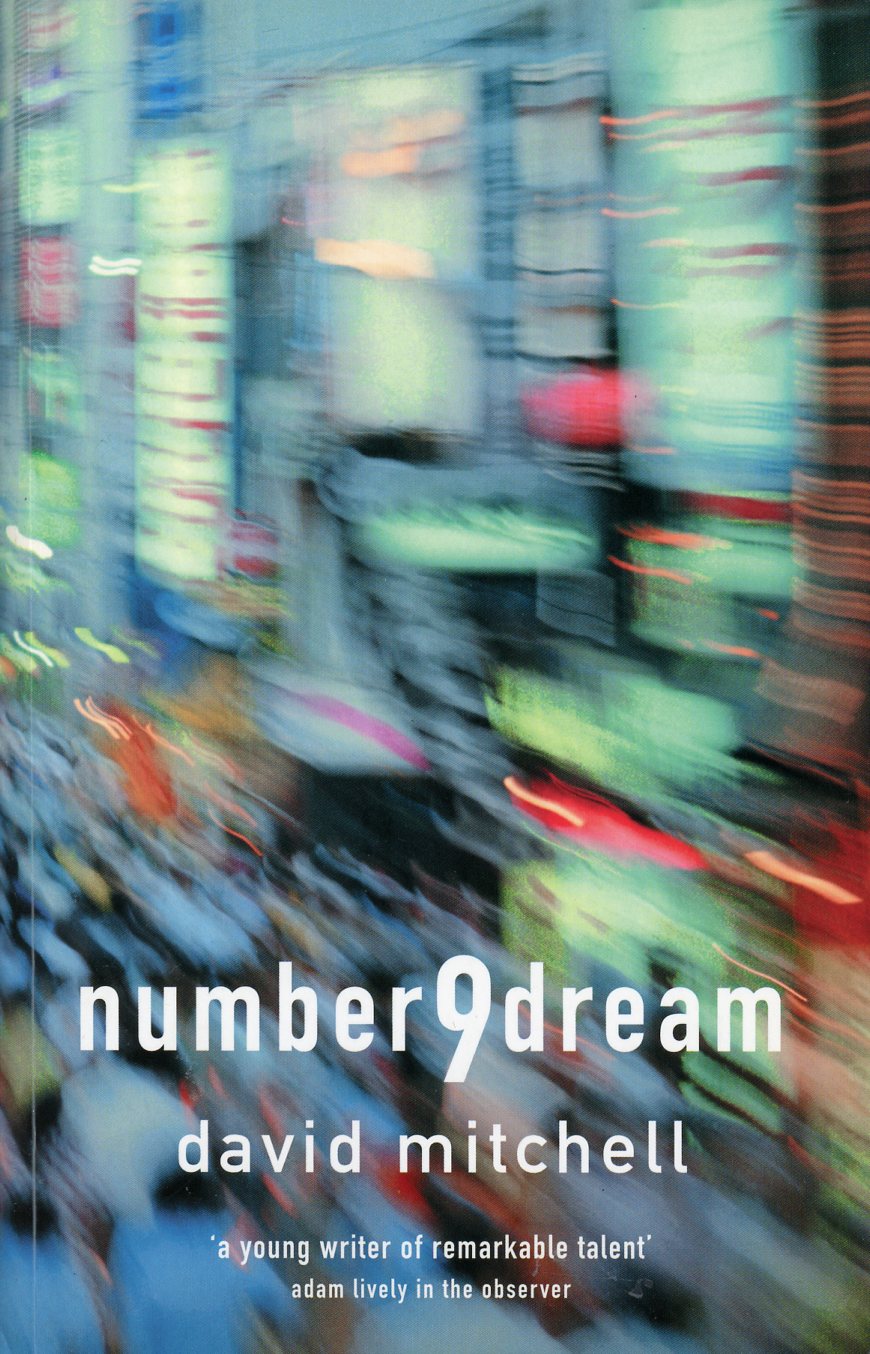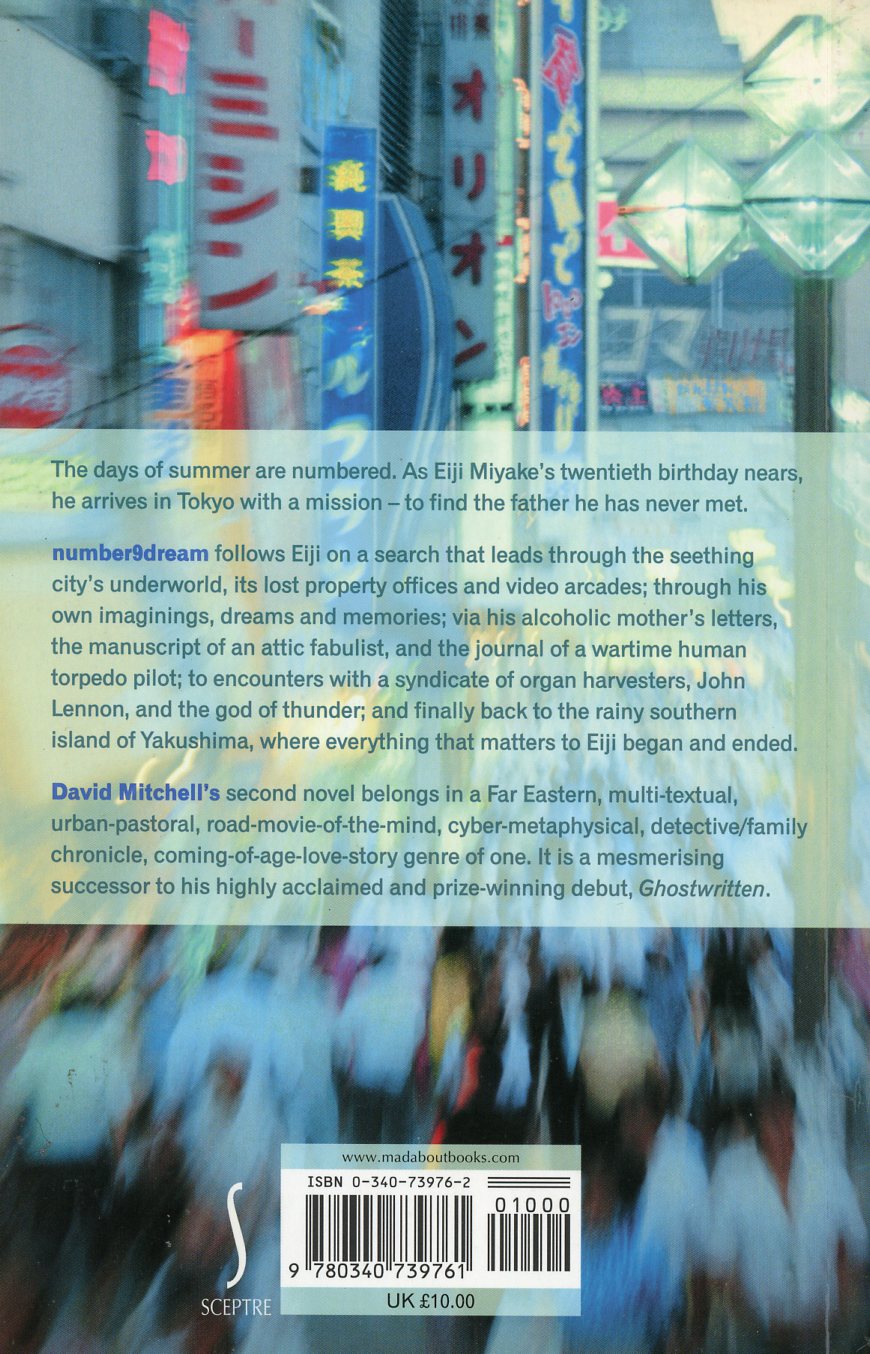
|

|
|
John Altman, The Korean Woman, 2020
Click on back cover to enlarge
Yosha Bunko scans
|
David Mitchell
number9dream
London: Sceptre (Hodder & Stoughton, 2001
419 pages, paper cover
Eiji Miyake and his twin sister Anju, were abandoned by the father at birth, and then by their alcoholic mother, who was not married to their father. They were raised by their grandmother, but Anju drowns when they were 11, and when Eiji is about to turn 20, he goes to find his father, and finds himself in a world that mostly overwhelms him, both in reality -- and in surreal dreams that reflect Mitchell's character more than his.
The story unfolds in 9 chapters. Chapter "One" -- titled "Panopticon" -- features Eiji attempting to meet Akiko Katō (Mitchell's macron), an attorney he believes knows his father's whereabouts. In chapter "Seven" -- "Cards" -- Eiji talks to his mother on the phone but does not meet her. He also finds his father, and sees and exchanges words with him, but his father doesn't know who is is, and is so disgusting he leaves without reveal his identity.
In chapter "Eight" -- "The language of mountains is rain" -- Eiji leaves Tokyo to see his mother in Miyazaki. He then goes to Yakushima to see his grandmother, but when he arrives she is not home. As was her habit when going out, however, she had left the radio on, so Eiji sits on the sofa to await her return. He begins to dream, then hears the radio announce that Tokyo had been struck by a massive earthquake. Imagining what might have happened Ai Imajō (Mitchell's macron), a waitress he has fallen in love with, he grabs his bag, opens the door, and starts running.
Chapter "Nine" has no title, and subsequent pages are blank. This was anticipated in the following encounter between Eiji and John Lennon, and others, halfway through chapter "Eight" (page 398, dialog only, narrative omitted).
'Which is your favourite song by John, Eiji-kun?'
'"#9dream",' I answer. 'It should be considered a masterpiece.'
'Truth is,' John continues, "#9dream" is a descendant of "Norwegian Wood". Both are ghost stories.'
'What does the title mean?'
'The ninth dream begins after every ending.'
Mitchell's tongue-in-cheek betrays the weaknesses of this bloated Murakami-esque novel. His prose can be mesmerizing, but the cover art is clearer than the narrative. Reading the book is like running a maze, slamming into numerous dead ends, needing to climb a tower now and then to see where you are, then stumbling out the exit into a world with no landmarks. You have no inklings where to go, but having been hooked by Mitchell's soap opera, you are tempted to chase Eiji back to Tokyo -- to find out if Ai Imajō is dead or alive in the rubble, and whether she is real or surreal, suspecting that she might be a product of Artificial Intelligence Imagination.
David Mitchell worked in Japan for several years and married Keiko, to whom number9dream is dedicated. One of the stories in his 1st novel, Ghostwritten (1999), was also partly set in Japan. number9dream, his 2nd novel, and Cloud Atlas (2004), his 3rd, were shortlisted for the Booker Prize. His 4th novel, Black Swan Green (2006), which is narrated by a stammering 13-year-old boy. Mitchell himself has a stammer and is a member of the British Stammering Association.
As of this writing, Mitchell has published 5 more novels, 1 novella, numerous short stories and articles, a screen play, and a translation of a short story by Miyazawa Kenji. And Keiko Yoshida and David Mitchell have co-translated a couple of Japanese books purported to have been written by an autistic boy, the first when he was 13, through "facilitated communication". The books, best sellers in both languages, have stirred controversy because scientists who study autism are skeptical of claims of "facilitated communication", which are not unlike beliefs in "channelling".
|